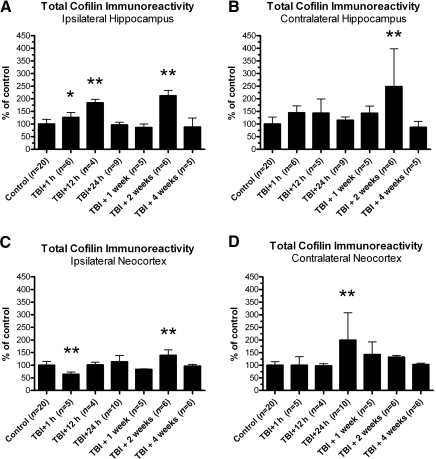FIG. 5.
Lateral traumatic brain injury (TBI) generally caused transient increases in total cofilin immunoreactivity. Western blot analyses were repeated using an antibody recognizing cofilin regardless of serine 3 (Ser3) phosphorylation status (total cofilin). Analyses revealed time- and region-dependent changes in total cofilin immunoreactivity, relative to controls. In the ipsilateral hippocampus, for example, total cofilin immunoreactivity was increased at 1 h, 12 h, and 2 weeks post-TBI, relative to controls (A). In the contralateral hippocampus, total cofilin immunoreactivity also increased above control levels, but only weeks later, at 2 weeks post-TBI (B). Unlike all other brain regions tested, the ipsilateral neocortex showed a decrease in total cofilin immunoreactivity at 1 h post-TBI, relative to controls. However, total cofilin immunoreactivity returned to control levels by 12 h post-TBI, and then increased above control levels weeks later, at 2 weeks post-TBI (C). The contralateral neocortex underwent a delayed increase in total cofilin immunoreactivity at 24 h post-TBI, relative to controls (D). All comparisons were made by one-way analysis of variance with Dunnett's post-hoc test (*p<0.05, **p<0.01).

